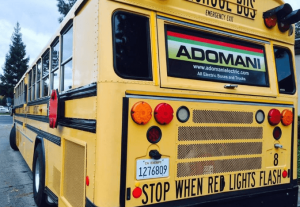Adomani Flies High After IPO
If you’re one of a growing group that feels that school buses are lagging behind in automotive technological and environmental progress. Electric school buses would be cool, right, but are they practical? So who’s making them?

How about a company called Bluebird, the number one school bus manufacturer in the country. With the help of Adomani Inc., a California company, Bluebird has added an electric school bus to its repetoire.
Jim Reynolds, president and CEO of Adomani, just led his company through an IPO as a follow-on to the company’s crowd-funding start up. The IPO netted the company $9.2 million. As Reynolds told Clean Fleet Report in a recent interview, the money will be used to take an R&D company to a stage where its technology can be commercialized.
Specifically, the money is being used to develop a new school 72-passenger bus product. Adomani has demonstrated the capability of its technology in various government-sponsored projects, but now hopes to see its products picked as the winner in bids in Southern California. The company is aiming to have the capacity to build 200 buses a year.
The second project Adomani has on its plate is to develop electric drivetrains for Class 6/7/8 products—trucks and transit buses, Class 4/5 cab-over trucks, walk-in delivery vehicles (a market that has already claimed several EV startups) and shuttle buses.
Adomani uses LiFePO4 (lithium-ion phosphate) battery chemistry, but can also source other chemistries. They have developed a system that reuses the original buses’ OEM transmission, cooling system, power steering, air brake system and alternators-12/24-volt systems. That helps keep the electric bus costs down.

Batteries are still the biggest cost in an electric bus, but Adomani can offer school districts two options—increased mileage (beyond the basic 100 miles/day package) or reduced costs.
The company has no sales yet (as of the last quarter)—and it will need them soon to avoid the fate of earlier companies in this segment. Right now Adomani and any others in this end of the business are dependent on government subsidies and mandates to push these vehicles into the market. Adomani is also building a dealer/service network to support the expected sales and is certified to receive incentives from the state of California. The buses themselves have been well-received when they are in place, but also require new infrastructure in many cases.
So in the end what may seem like the obvious next step for school buses is going to take some time, but it’s already started.
